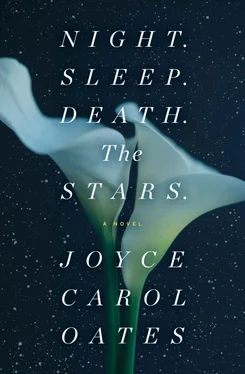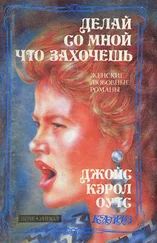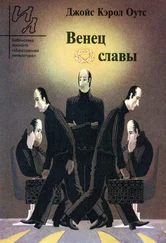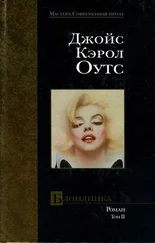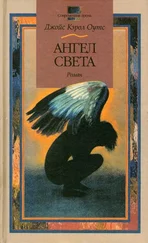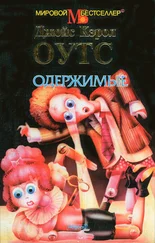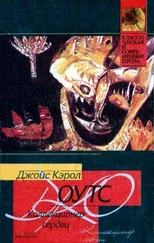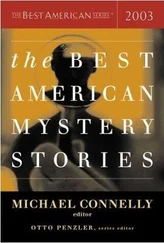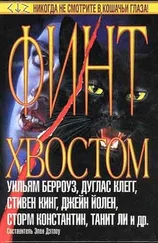“Sophie and Virgil won’t object. I don’t think so. Virgil might even want to be involved. I’m sure he’s sympathetic with the Liberators.”
And Whitey, what would Whitey think? God damn he’d have been surprised, indeed shocked, initially disapproving but in time, knowing Whitey, his generosity, his affable resignation to what he’d called expediency, political or financial expediency, a fancy way of saying whatever the hell came next, essentially Whitey would have been impressed that his wife, his widow, dear sweet unassertive Jessalyn, has so extended the perimeters of her life, as she has dared to travel to a part of the world he’d never seen, nor would have imagined seeing; as she has dared to remarry, and to keep herself alive. He’d have been happy for her, that his spirit might prevail in the house— Think the best of me, Jessalyn. I tried to be the best person I could be and if I was not, I can be that person now. If you love me remember me in that way.
IN THE SKY AT DUSK,a new moon of the delicate pale-orange hue of a cut melon. So beautiful!
It is a full moon glimpsed through skeins of slow-moving clouds, dimpled with shadow, luminous. Difficult to think of such glowering light as merely reflected, lacking its own life.
They have dragged deck chairs close together so that they can sit hand in hand, bathed in this strange pale-orange moonlight. Between them, two glasses of delicious dark red Ecuadorian wine.
Wanting to be alone they have ascended surreptitiously to the third level of the Esmeralda . Some areas of the ship are popular, others near-deserted. This is an area that is totally deserted though the view of the sunset has been spectacular.
Many Esmeralda passengers gather at the prow of the ship where there is a cocktail bar, guitarists playing festive Latin music. Others gather downstairs in a large bar, adjacent to the enormous dining room, where American pop-rock music plays continuously, grating to the ear.
Hugo especially wants to be alone with his wife, just for now. Away from the unwanted solicitude of others. He has purchased a glass of wine for each of them with the assumption that, if Jessalyn doesn’t finish hers, he will be welcome to finish it as usual.
Jessalyn laughs, wine goes quickly to her head. She wonders at the wisdom of drinking, after an exhausting day in the Galápagos.
Hugo has been limping more noticeably when he doesn’t think that anyone is watching. He has gripped the stairway railing, to haul himself up to the third deck. Jessalyn pretends she has not seen.
It is like sighting Hugo in the hospital, in the Oncology ward. Or someone who resembled Hugo. Best to pretend you do not see.
Drinking makes Hugo melancholy but also elated, prone to laughter.
What a joke it is!—on his honeymoon, his God-damned knee is ruined .
Well, not ruined— not exactly.
Jessalyn laughs at him. Why does he exaggerate so much?
In his photographs Hugo does not exaggerate at all. A deeper and more profound Hugo emerges in the photographs, not always evident in the man.
The artist is fearless, Jessalyn thinks. The man, not always.
In the main dining room of the cruise ship it has become known (somehow) that Jessalyn and Hugo are newlyweds. (Did Hugo tell someone? Jessalyn certainly did not.) The very term newlyweds is quaint, touching. Strangers smile at them affectionately. A beautiful brave “older” couple. But now Hugo, who never fails to dress for dinner (long-sleeved, embroidered white shirts open at the throat, with cuff links, sometimes a sport coat) seems to be limping. Oh, did Hugo hurt himself?—on one of those trails? Perfect strangers are sympathetic.
Coming down a steep path too fast. His own God-damned fault, Hugo will say. As own God-damned fault needs to be acknowledged.
Hugo insists upon sitting at different tables for most meals. There are no assigned tables on the cruise, fortunately, so no one is stuck with anyone else. Of course, Jessalyn would return to the same table, to the same people with whom they’d struck up a previous mealtime conversation, out of courtesy, or a wish not to hurt feelings, for she recalls the painful choices of middle school and high school, when she’d felt obliged to sit with girls less popular than her friends and herself, out of a dread of hurting feelings; but Hugo is shockingly indifferent to the feelings of their fellow passengers, including even people with whom (Jessalyn had thought) he had gotten along very well. Hugo’s philosophy is that there are always more interesting persons somewhere close by, it is up to Hugo to seek them out—among the Esmeralda passengers are biologists, specialists in endangered species and global warming, research scientists, mathematicians, university professors and public school teachers, teenaged science prodigies, many amateur photographers, even an animal trainer. In his handsome clothes, his silver-streaked hair brushed back from his forehead, Hugo Martinez is a popular figure on the cruise ship; Jessalyn, beside him, is the gracious wife.
It is dusk now. On the open deck Jessalyn shivers. Over her shoulders, the white-lace shawl Hugo purchased for her as a bridal veil. But the shawl isn’t very warm or practical.
Each day in the tropics the air is altered as soon as the sun disappears beneath the horizon. There is a particular sort of visceral anguish—foolish, involuntary—one feels as the glowing-red sun perceptibly sinks away. There arises then a prevailing wind with an undercurrent of cold.
Cheered and enlivened by the delicious dark-red wine, Hugo is talking about the Galápagos—this place of wonders! How he’d wanted to come here for much of his life but had never quite made it until now. For a while, he’d hoped to come with his son who’d died. But they’d never quite made it.
Hugo is not so cheerful now. He is a man of moods, Jessalyn has discovered. She must learn to accept these moods as they come, and to prepare herself (she suspects) for darker moods, hidden from her so far. She guesses that there are numerous painful losses in Hugo’s life in addition to the loss of his son but he speaks only of his son.
For a man so seemingly extroverted, so curious about others’ lives, Hugo is in fact quite reticent about his own. Jessalyn has casually asked him about his health and Hugo has said he is fine.
Really? He is fine ?
Absolutely fine —“Don’t I look good? For my age, at least? And what about you, dear Jessalyn? You look lovely but—how is your health?”
Teasing her. Expecting her to laugh.
If she’d asked him about the hospital, had he an appointment in the infusion room, Hugo would have deflected the question with a joke. But that wasn’t me, Jessalyn.
And— Of course, it wasn’t me.
But there is no one like you, Hugo. I would not mistake you for anyone.
I think you must have mistaken me, dear. For someone else.
If you are ill—please tell me. I want to know.
Not ill. Not now. Or if I am, I am in remission.
In remission? What do you mean?
Kiss me!
Shortly before they’d left for Ecuador Jessalyn happened to notice a tight adhesive bandage around Hugo’s upper arm; when she’d asked what it was Hugo said he’d donated blood that day, at the medical center.
Oh! Was it a custom of Hugo’s, to donate blood? He had not mentioned it…
With a gesture Hugo ripped off the adhesive bandage. Needle tracks beneath, not inflamed or reddened. He hadn’t liked being questioned and had declined to explain further.
Of course, Jessalyn had never told Hugo about the false-positive mammogram. If she’d had a malignancy she would have tried not to tell him. There are many things in her personal life she has not told Hugo. Such as— I am your wife but I am another man’s widow. A widow who remarries is a widow who remarries. Please understand!
Читать дальше
